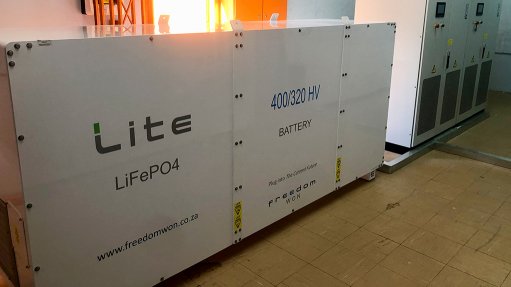Wireless mesh network connects 54 Northern Cape schools
The Department of Science and Technology (DST) launched the Northern Cape phase of the wireless mesh network (WMN) technology demonstrator project in the John Taolo Gaetsewe district municipality, providing connectivity for 54 rural schools and six other public facilities.
The project, funded by the European Union and implemented by research organisation the Council for Scientific and Industrial Research’s (CSIR’s) Meraka Institute, aims to demonstrate the technology developed at the CSIR, as well as alternative models of establishing information and communication technology (ICT) infrastructure and provision of services in rural areas, says DST Deputy Minister Michael Masutha.
The WMN project is focused on networking underserviced areas using short-hop, wireless mesh connections. This wireless network is then connected to the global Internet using a variety of connections, for example, wired, wireless cellular and satellite connections.
“The wireless network will give thousands of learners access to the Internet; it will also help rural communities to access information and improve communications and business opportunities,” he says.
The first phase of the project was launched in 2010 in the Nkangala, Mpumalanga, and Sekhukhune, Limpopo, district municipalities.
The WMN project has adopted two business models for implementation, namely the Nkangala and Sekhukhune model, which trained and developed local, young entrepreneurs also known as the Village Operators (VOs) to deploy, maintain and provide services over the network and the JT Gaetsewe model, which has a single contracted operator to deploy and maintain the network.
“This project gives local businesses opportunities to provide the infrastructure and services, which then helps to sustain employment within the communities,” says Masutha.
The wireless local area network (WLAN) connectivity will boost access to educational information for the schools, as well as enabling better communications between the schools and district offices. The technology can also be adapted to enable remote health services to be provided and governmental services and information to be accessed.
The lack of emphasis on a single technology also enables connectivity to be established cost effectively and, thus, sustainably.
“It is common knowledge that ICT has a positive impact on people’s lives,” says Masutha.
While outdoor WLANs usually serve a smaller number of users per node, owing to interference affecting the signals, the modular design of such networks means that they can be expanded when needed. However, the establishment of these networks does require specialised radio frequency skills, which is supported by the CSIR’s Meraka Institute.
Having ownership of equipment held by community organisations also helps to protect the equipment from vandalism and theft.
Meanwhile, learners demonstrated significant interest in interacting with information technology and using such devices to learn, says Learamele special school teacher Boitshoko Bannane.
“The introduction of computers will improve the learning process,” adds education district director Vuyisile Teise.
The WMN project is supportive of the Schools Connectivity project, which aims to bring connectivity to the approximately 27 000 public schools in South Africa.
Comments
Press Office
Announcements
What's On
Subscribe to improve your user experience...
Option 1 (equivalent of R125 a month):
Receive a weekly copy of Creamer Media's Engineering News & Mining Weekly magazine
(print copy for those in South Africa and e-magazine for those outside of South Africa)
Receive daily email newsletters
Access to full search results
Access archive of magazine back copies
Access to Projects in Progress
Access to ONE Research Report of your choice in PDF format
Option 2 (equivalent of R375 a month):
All benefits from Option 1
PLUS
Access to Creamer Media's Research Channel Africa for ALL Research Reports, in PDF format, on various industrial and mining sectors
including Electricity; Water; Energy Transition; Hydrogen; Roads, Rail and Ports; Coal; Gold; Platinum; Battery Metals; etc.
Already a subscriber?
Forgotten your password?
Receive weekly copy of Creamer Media's Engineering News & Mining Weekly magazine (print copy for those in South Africa and e-magazine for those outside of South Africa)
➕
Recieve daily email newsletters
➕
Access to full search results
➕
Access archive of magazine back copies
➕
Access to Projects in Progress
➕
Access to ONE Research Report of your choice in PDF format
RESEARCH CHANNEL AFRICA
R4500 (equivalent of R375 a month)
SUBSCRIBEAll benefits from Option 1
➕
Access to Creamer Media's Research Channel Africa for ALL Research Reports on various industrial and mining sectors, in PDF format, including on:
Electricity
➕
Water
➕
Energy Transition
➕
Hydrogen
➕
Roads, Rail and Ports
➕
Coal
➕
Gold
➕
Platinum
➕
Battery Metals
➕
etc.
Receive all benefits from Option 1 or Option 2 delivered to numerous people at your company
➕
Multiple User names and Passwords for simultaneous log-ins
➕
Intranet integration access to all in your organisation


















